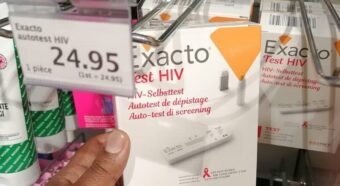Charting the Path Forward: Reflecting on The Future of Global Health Initiatives at the Wilton Park Dialogue
- October 30, 2023
- HIV/AIDS / Malaria / Tuberculosis
- By Fassika Alemayehu
- Read in French

Over the past few decades, Global Health Initiatives (GHIs) have made significant contributions to remarkable advancements in safeguarding lives and enhancing the overall well-being of people worldwide. Their achievements include substantial progress in combating specific diseases such as polio, malaria, tuberculosis, and HIV/AIDS, as well as expanding the reach of targeted healthcare interventions like vaccination programs. Recognizing the need to reflect on the great achievements of GHIs and looking forward, the Future of Global Health Initiatives (FGHI) was established to pinpoint strategies that can enhance the effectiveness, efficiency, and equity of GHIs. These enhancements are aimed at complementing domestic funding efforts to bolster healthcare systems and achieve meaningful health outcomes, all while aligning with a country-driven approach to prioritize healthcare initiatives and advancing the journey towards universal health coverage (UHC).
As part of the consultation process FGHI Co-Chairs, Dr Mercy Mwangangi and Dr John-Arne Røttingen spearheaded a gathering of key stakeholders representing implementing governments, organizations dedicated to health, donors, multilateral agencies, and civil society on October 4 to 6, 2023 at and in collaboration with Wilton Park, United Kingdom, for a pivotal dialogue that is poised to reshape the future of GHIs. The African Constituency Bureau (ACB) was represented by Susan Mochache, ACB board member and Global Fund Board member for the East and Southern Africa (ESA) constituency.
Against the backdrop of evolving demographics, shifting disease burdens, climate crises, and the lasting impact of the COVID-19 pandemic, the imperative for adaptability in global health financing has become increasingly evident. This sense of urgency underscores the need to reconfigure the global health financing landscape, aligning it with the ever-evolving healthcare requirements of the future. The discussions focused on issues of strategic interest for our countries including country ownership, enhancing efficiencies through joint planning and reporting, and embedding sustainability by GHIs in the country. The consensus reached among participants outlined five strategic shifts that will guide the evolution of the global health financing ecosystem beyond 2030:
1. Making a stronger contribution to primary health care
GHIs aim to make a more substantial contribution to Primary Health Care (PHC) by supporting the integrated delivery of health services and resilient health systems. This involves aligning with high-quality, prioritized national plans that focus on resilient PHC as the foundation for achieving UHC.
2. Mainstreaming sustainability across GHI portfolios
The objective is to integrate sustainability across GHIs by revising policies, operating models, grant-making approaches, and incentives to align with financial and programmatic sustainability. This aims to facilitate a gradual transition from GHI support as countries become economically self-sustaining for their integrated health services.
3. Maintaining focus on achieving equity in outcomes
GHIs actively work to address disparities and eliminate barriers to health services, particularly in areas where government capacity or commitment is lacking. They adopt tailored, country-specific approaches to extend the reach of formal healthcare systems, with targeted initiatives designed to benefit vulnerable and marginalized populations and promote gender equity.
4. Achieving strategic and operational coherence
Striving for strategic and operational alignment is a priority, and this effort is made more effective through governance and operating models that are supportive. The systems and procedures in place are designed to minimize any undue burden on the countries involved.
5. Coordinating approaches to products, research and development, and regional manufacturing to address market and policy failures in global health.
This approach aims to ensure the development and manufacturing of high-quality, fit-for-purpose health products. GHIs gather and share user insights to guide product development and provide short-term incentives or risk mitigation for commercialization to ensure affordable, timely, and sustainable access.
These five strategic shifts therefore reflect a collective acknowledgement of the urgent need for a fresh approach in addressing global health challenges, ensuring that no one is left behind. In the dialogue, participants made significant strides in identifying short-term actions to implement these shifts. In particular, the proposal to establish a joint operational team consisting of the Global Fund, Gavi, the Global Financing Facility, the World Bank, and the World Health Organization. This initiative received substantial support and aims to streamline operations and enhance oversight through GHI governing bodies.
Furthermore, the dialogue underscored the pivotal role of GHI boards in overseeing the implementation of commitments and the imperative of strengthening cross-board collaboration. It also highlighted the potential for linking with the African Union lead initiative of the Africa Leadership Meeting (ALM) as a powerful regional mechanism for engaging with heads of state and government. Additionally, there was enthusiasm for creating a “Friends of the FGHI” arrangement to drive implementation and accountability as the FGHI process concludes at the end of 2023.
Building upon the insightful discussions held at the Wilton Park Dialogue, it becomes clear that the ACB’s strategy to offer technical support to African board members within GHIs is both timely and crucial. The ACB, in partnership with its collaborators, is unwavering in its commitment to fostering continuous dialogue among African countries and stakeholders on how to improve and strengthen their collective influence and involvement in GHIs and other relevant global health discussions and decisions. The ongoing evolution of the ACB is thus poised to realize this vision, ultimately leading to improved regional coordination, consolidation, and a more unified African voice within GHIs.
Fassika Alemayehu


